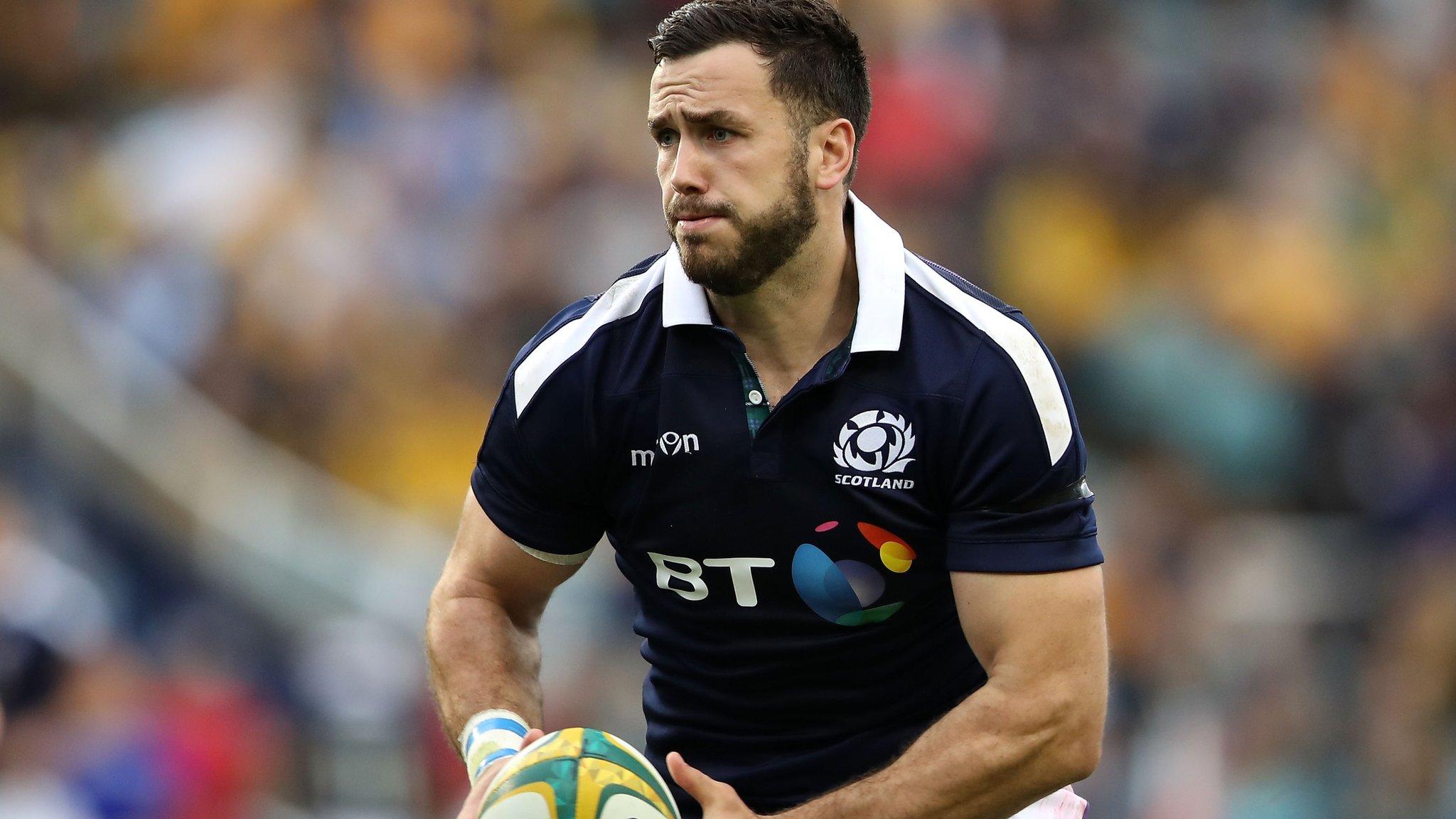British and Irish Lions: Ken Scotland recalls swashbuckling tourists of 1959
- Published
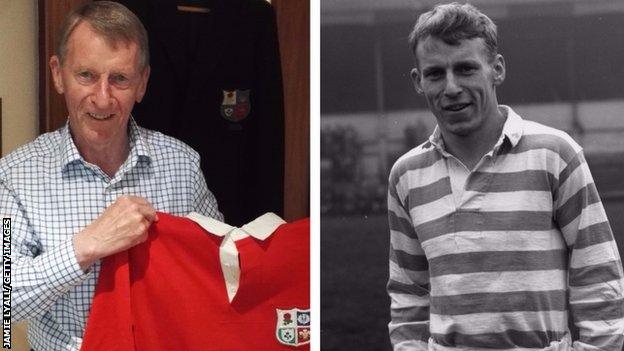
Ken Scotland with his 1959 Lions tour jersey, left, and in the blue and white of Cambridge University in 1958
Ken Scotland is snugly ensconced in what he likes to call his "nostalgia-stroke-vanity room" - a cosy lair that pays homage to a bygone era of unblemished rugby romance.
This little den is festooned with quaint mementos. Ranks of black-and-white photographs line the walls.
One image hangs slightly prouder than all its counterparts, its contents elevated to mirror their position in the former Scotland full-back's grand career.
The picture was taken in 1959. Thirty blazered Lions peer through the glass frame, preparing to embark on a five-month odyssey to the other side of the globe, the mighty All Blacks lying in wait.
That tour was a voyage of extreme physical and psychological resilience - 33 matches and more than 30 flights, four punishing Tests and provincial battles that could get every bit as tough, swashbuckling back play and one towering goal-kicker.
No coach? No problem
"It was a hugely exciting prospect and looking back, it was the trip of a lifetime," Scotland, now in his 81st year, recalls.
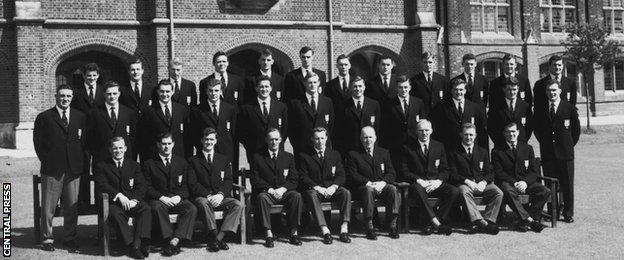
The 1959 Lions toured with only two staff - a manager, Alf Wilson, and his assistant - and no coach
"It was very much a player-led tour. I read there's something like 90 people on this year's tour. We had two staff - the manager and his assistant.
"His job was to hand out the 10 shilling-a-day pocket money, and dole out Rothmans cigarettes, if anybody wanted cigarettes.
"There weren't many smokers but one or two took them because, like being in jail, they were a form of currency.
"[The staff] didn't appear at training, and once we were on tour, we were travelling twice a week, playing twice a week. The team who were playing the next game would have a run-out, that was basically led by whomever was captain that day."
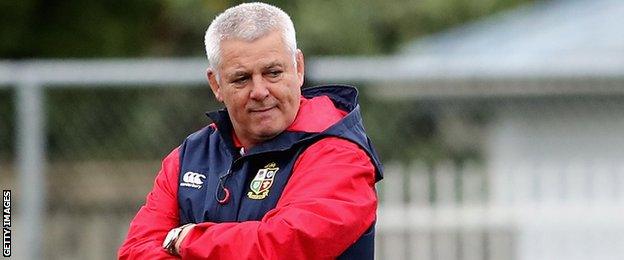
2017 Lions boss Warren Gatland selected an initial 41-man tour squad, and has called up six more players
The cream of British and Irish rugby, bereft of a coach, puffing on Rothmans and trading smokes like inmates. An absurd image? Perhaps, but this was 1959, the year Fidel Castro seized power in Cuba and The Sound of Music opened on Broadway. Neil Armstrong was still a full decade from taking one small step for man.
'We had 15 forwards to play 33 games'
Scotland chuckles now about the "supposedly non-stop" flight that took three days, and seven refuelling pit-stops to reach Melbourne, and meanders through the "low-key" six-match preamble in Australia.
The whole business seems hilariously alien today, yet some tenets of the trip are every inch as valid now as they were then.
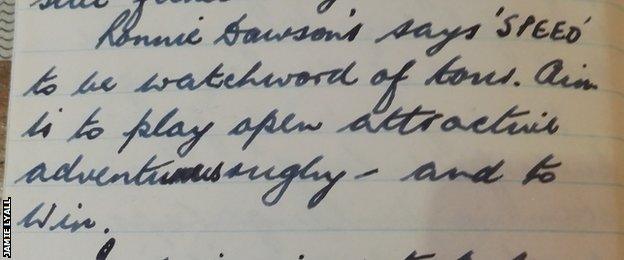
Scotland's tour diary notes the Lions' intent to play "open, attractive, adventurous rugby - and to win"
"With Gregor Townsend's Scotland team, the watchword seems to be speed - it's getting a lot of publicity in the press," Scotland says, thumbing open the handwritten diary he kept to chronicle the tour.
"As it happens, our watchword on the 1959 tour was speed, set out by captain Ronnie Dawson. It's amazing how things come around.
"Back play in New Zealand at the time was actually at a pretty low ebb. It was a very forward-dominated game. We wanted to play 15-man rugby, which they just didn't do.
"To do that, you've actually got to have extremely good forwards, because unless you're getting good ball, your backs are going to be knackered.
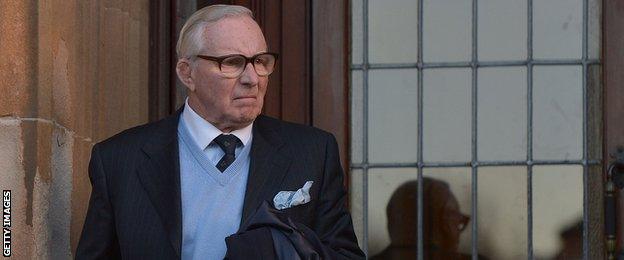
Ireland's Ronnie Dawson, pictured in 2014, captained the 1959 tourists
"We only had 15 forwards to play 33 games against tough, forward-oriented opposition. No replacement forwards came out. We had three replacement backs but no forwards. I don't think praise can be too high for the level they sustained over that number of games."
'We thought it was grossly unfair'
With the forwards' mettle holding against the beefy titans of New Zealand rugby, the Lions backs could play, stunning the Kiwi punters and press with their attacking elan.
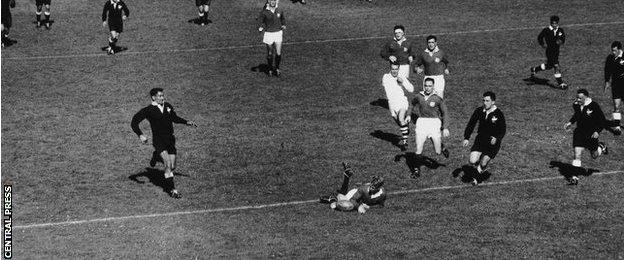
Scotland dives over the line in the Lions' clash wit NZ Maori, but he is ruled to have lost control of the ball, and his effort is disallowed
Scotland, a dashing 22-year-old, came fizzing into the backline in a manner that belied traditional full-back play. In the first Test at Carisbrook, the Lions ran in four unanswered tries, only to be conquered by Don "The Boot" Clarke, Scotland's powerful opposite number, who boomed over six penalties.
"We at the time thought it was grossly unfair," Scotland says. "We got to a point where we were 17-9 ahead with maybe 15 minutes to go, and we had scored four fairly convincing tries.
"Don Clarke then kicked three goals - two of them were debatable. One went straight over the top of a post, and as a full-back, that's something you're very conscious of.
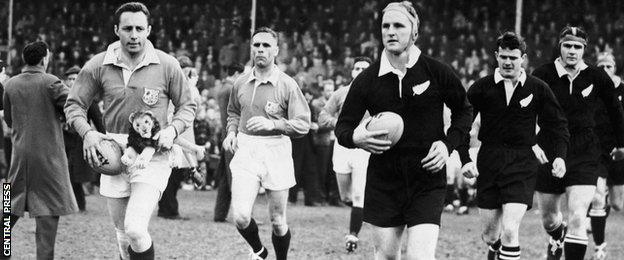
Captains Ronnie Dawson and Wilson Whineray lead out their teams for the opening Test in Dunedin
"Not only were there were no neutral referees, but of the touch judges, one was a New Zealander, and one was one of our players who didn't play. We provided a touch judge for every game. Our man Mick English didn't signal. That kick was given.
"Some of the players felt the refereeing was absolutely awful. He was just an average referee doing his best, from where I was. But he never refereed again - certainly not an international."
'The best team spirit I've ever come across'
Many a Kiwi was said to be mortified at winning an international in such dour, try-less fashion. The All Blacks snatched the second Test too, Clarke again the tourists' tormenter, scoring and converting a last-gasp try, before soundly beating the Lions in the third for an unassailable 3-0 lead.
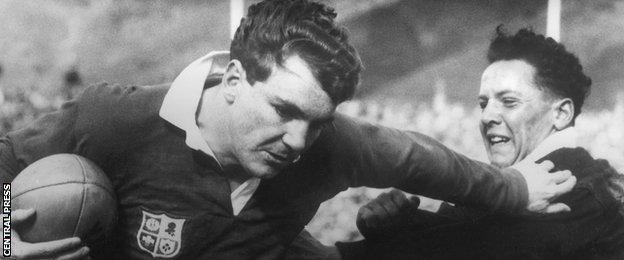
Ireland's Tony O'Reilly was the star of the tour, scoring a record 22 tries
Then came the final showdown at Eden Park, the fortress of New Zealand rugby, where no Lions side had ever prevailed, and none has triumphed since.
"There was a huge feeling of anti-climax after the first Test. We always thought if we got enough ball we could score points and that was true other than the third Test, where we actually played very badly.
"In the last Test, we scored three tries to their none, on a terrible, wet, muddy Eden Park pitch which was really suited much better to them.
"In some ways, that sums up the spirit of the tour, because when we lost the third Test, we still had about seven or eight games to go.
"The adrenaline had gone, we had a number of injuries, we were down players, but we actually managed to win all the other games.
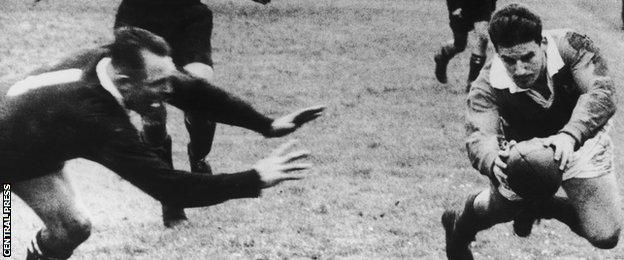
Bev Risman of Wales scored a late try as the Lions finished the series with a fourth-Test win at Eden Park
"And in terms of sheer team spirit, that's the best I've ever come across. Everybody really just gritted their teeth and decided that we were going to get some compensation out of it.
"We lost two provincial games in the South Island to Canterbury and Otago. When we got to the North Island, every side was absolutely desperate to beat us, and every Saturday game was a real tough physical and mental battle.
"It became more mental towards the end. Our 30th game was in Whangarei, where the 2017 boys started.
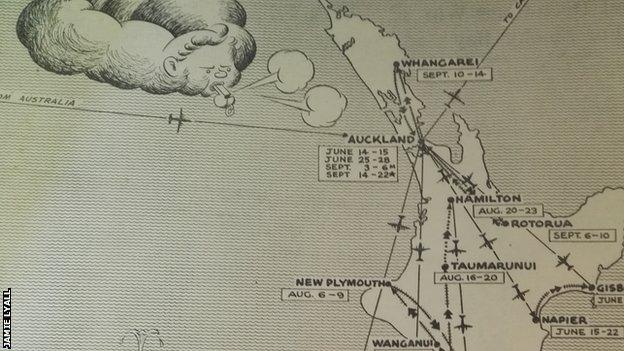
As the official tour itinerary shows, the Lions' final fixture came in Whangarei, New Zealand's northernmost city
"They had a huge pack of forwards, and all the pre-match publicity was about what they were going to do to the tiring Lions. We were going to get absolutely stuffed, and they were going to be the first side from the North Island to beat the Lions. We actually hammered them - and we took that into the final Test."
After almost five months away from work, wives and familiarity, the Lions stopped off in Canada for two more Tests, before at long last setting course for home.
Bigger budgets, poorer game
Within two days of arriving in Edinburgh, Scotland was coerced into running out for Heriot's, the club where his rugby infatuation began, and where he can still be found every other Saturday.
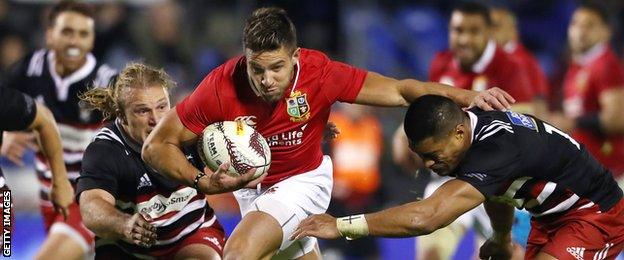
The Lions began the 2017 tour in Whangarei against the Provincial Barbarians
"I think largely because the players make more mistakes, but are still quite ambitious in the style they're playing, it's a better game to watch than the Pro12," he says. "I actually find most of the Pro12 stuff pretty dreary.
"It's so brutally hard now, there is no space, so they're running into each other, and it's very, very repetitive.
"It's money that's talking. You get some multimillionaire who might be very fond of rugby, but is used to winning, so he uses his money to produce a fabulous team. It doesn't impress me all that much.
"It's much better to rely, as they used to, on local talent. You can't be playing quite so much from the heart if you're playing from your wallet. I don't think that's being overly cynical.
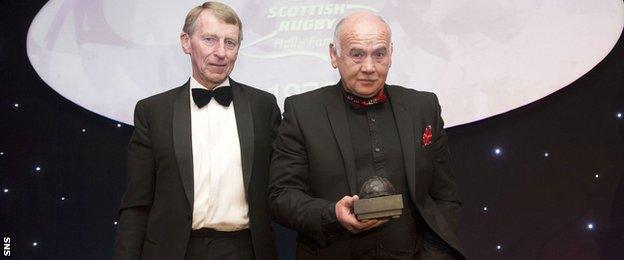
Scotland presents fellow great Jim Renwick with an award at a Scottish Rugby event in 2013
"Having said that, I think the guys currently playing for Scotland do it because they enjoy playing and are ambitious to play for Scotland - all things that I wanted to do.
"But none of my contemporaries that I speak to wish they'd been playing in today's game. Whether they made money or didn't was totally irrelevant. We enjoyed each other's company, got on well together, and had respect for each other."
- Published19 June 2017
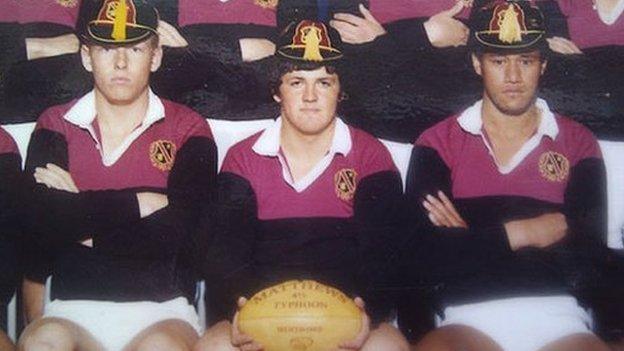
- Published18 June 2017
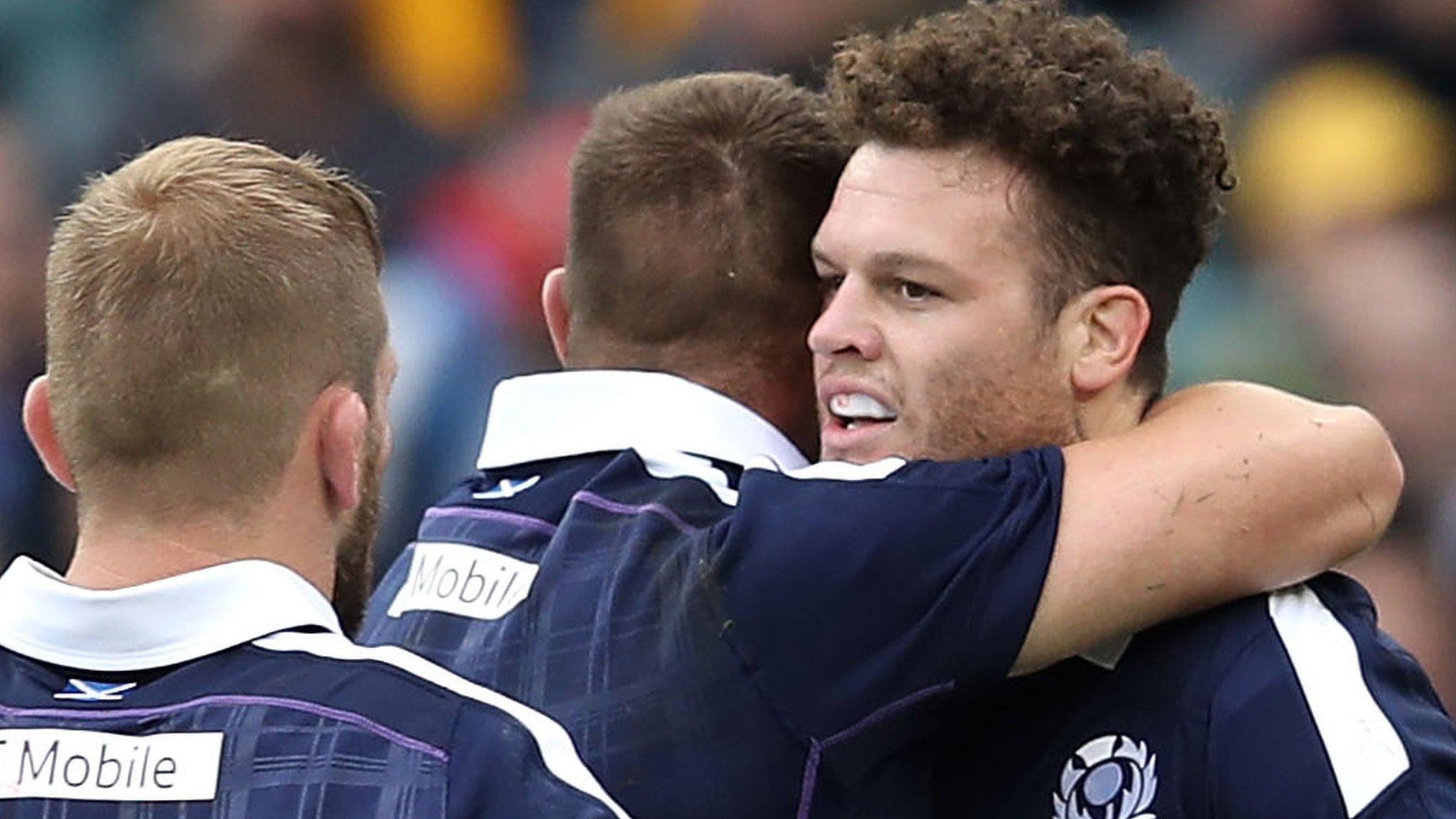
- Published18 June 2017
